CAMOUFLAGED: Part II, Vadim Panasyuk
November 26, 2012
In Part II of The Observer’s new mini-series, “Camouflaged,” we meet Vadim Panasyuk, 28, a former E-5 Sergeant in the Army who served two tours of duty in Iraq from 2005 to 2008. Originally from Zaporozhye, Ukraine, Panasyuk moved to the United States in 1997. Soft spoken but straightforward, he discusses the mental and emotional toll a number of veterans suffer when they arrive back home. According to Panasyuk, “You either got to put your shit together and move on or you don’t.” Panasyuk definitely put his shit together–he has an associate degree in political science and international relations from Bergen Community College in New Jersey. Now at Fordham, he is majoring in clinical social work and aims to have his master’s degree within three years.
As mentioned in Part I, we hope to document for a brief moment the stories and military experiences of our fellow classmates as well as recognize them for their unwavering service to our country. For that, we sincerely thank you.
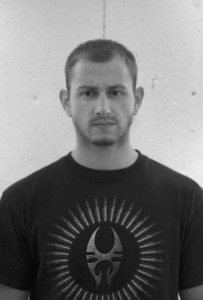
Joining the Army
“I joined in 2003 but I got to basic in January of ’04. It was shortly after 9/11 and the war was happening. Since I was a kid I sort of knew what I was going to do. I used to read a lot about military history. On my father’s side, everyone served in the Soviet army going back to pre-WWII. I used to always say that I’d never join the army in peacetime but 9/11 kind of made that decision for me. I was stationed in Fort Seward, Georgia with the Third Infantry division. I was in there for almost five years. I did two tours in Iraq, all of 2005—12 months and during the surge from May of ’07 to July of ’08, so 15 months there. After that, I got out.”
“I was in the infantry. My first tour was as a saw gunner, just basically light machine gun. I was also a jump gunner which went on Humvees all the time. In 2006 after we got back, I went and did a lot of combatives, went to sniper school and deployed again as a sniper with the 30th infantry battalion and spent 15 months in charge of a sniper team in Iraq. [Active combat] is what it is, man. You go out, you do what you have to do, there is contact with the enemy and you do what you were trained for. When that happens for months and months and months, essentially years at a time…it depends what happens. When you take a lot of casualties, even wounded guys…when you get wounded over there, it’s not like you sprain your ankle. You’re burned or you’re missing limbs. You’re either like, ‘Oh shit, I’m good or I’m fucked!’ There is very little in between.”
Any injuries or wounds?
“A purple heart was one of those things I didn’t want (laughs).”
Coming home
“At first it wasn’t easy. I kind of wanted to rip everybody’s head off. When I first got back, I spent a lot of time drinking, hating the world. But I leveled out— you either sink or swim— you either got to put your shit together and move one or you don’t. I’m doing well now— I’ve got a clear plan. I lived in Hackensack and Fort Lee, right now I live in Cliffside. This summer I worked as a camp counselor but the funds were atrocious so I moved back in with my parents. But I’m trying to save up so I can move to Queens or something.”
‘Like playing ping pong with a brick wall’
“Classes are going well. I know it’s a Yellow Ribbon school but I haven’t been involved in too many veterans activities. There’s one veteran who posted a job for a moving service on the weekends. There’s a community of veterans here that will help each other out. A lot of times you spend time with guys you can relate to. A lot of times it’s hard to talk [about the war]…when people ask, it’s like, ‘I’m not going to tell you’ because it’s like playing ping pong with a brick wall. They’re gonna sit there and go, ‘Oh that’s crazy man.’ It’s whatever. Its nice to have dudes you can crack a joke with and they know what you’re talking about.”
Future Plans
“I’m going for a master’s in clinical social work which is actually a departure from what I was doing before. In the last years since I’ve been out in 2008, I’ve had a couple buddies of mine commit suicide…just knowing the types of things I was going through when I got back it kind of made me want to reassess some things. I’m trying to work with the V.A. [office of Veterans Affairs] and work with other veterans that got out because the United States isn’t going to stop fighting wars anytime soon. There’s going to be an influx of those guys coming back and the V.A.’s pretty broken right now. So if you can’t beat ’em, join ’em.”
Post-war and Yoga
“I never contemplated suicide. I never saw that as a solution…I had a moment where I was distancing myself from a lot of people. I had a girlfriend when I got back and I was…I wasn’t right in the mind. She left me and you know, it took me a lot to restructure my mind. In 2009 during the summer, I never did yoga in my life but I decided to go for a month and meditate and just get my mind back down and leveled. I haven’t done yoga ever since (laughs), but it really gave me the time to come back down to earth because when you come back, especially with guys involved in combat, there’s two types of veterans you will see: there are guys who will deploy and maybe not fire their weapon the hold time. But they come back and start beating their chest. But then there are guys who come back and lose it because when you return from high-intensity combat operations you can’t just stop. Pretty much what I did, I came back from Iraq and then my contract was up. I was stop/loss for a bit and then I was home. You don’t have a supportive group like the boys you were over there with. You have to transplant yourself back into this world that doesn’t seem real.”
Tattoos
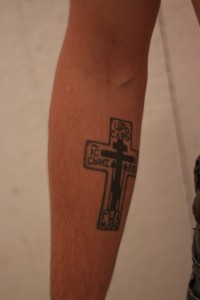 Eastern Orthodox Soldier’s Cross
Eastern Orthodox Soldier’s Cross
“In the 1200s, the Eastern Catholic Orthodox or whatever it was back then, the Russo Church at the time, they used to issue them to soldiers before battle and bless them.”
Symbol of Islam, skull and cross bones (Not shown)
“It kind of symbolizes the war to me—this is the symbol of Islam and the skull and crossbones signifies conflict or death, a type of struggle. It’s kind of fitting for me.”
“This one is just a little memento. It has the years when I was deployed and it has the rotations. OF3 was in 2005, OF5 was ’07-’08.”
“I have this one on my side. That one is weird. I was having these weird dreams at one point with these barbaric, weird, crazy lava scenes and the underworld. I would see this figure. I described it to the tattoo guy and he drew it up.”
“It’s the motherland (laughs).”

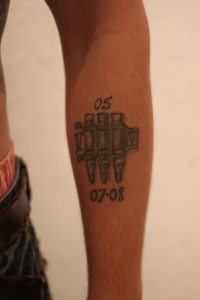
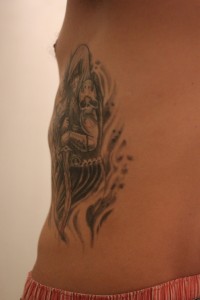
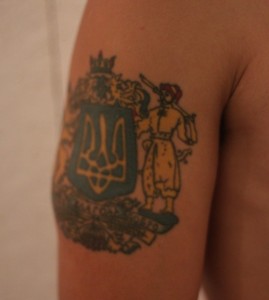











Darlene Madden • Nov 27, 2012 at 12:50 pm
Nice article! Very interesting to see what these guys go through and the fact that he is from another country!! Nice job Mike, god bless you Vadim, I hope you find your way!